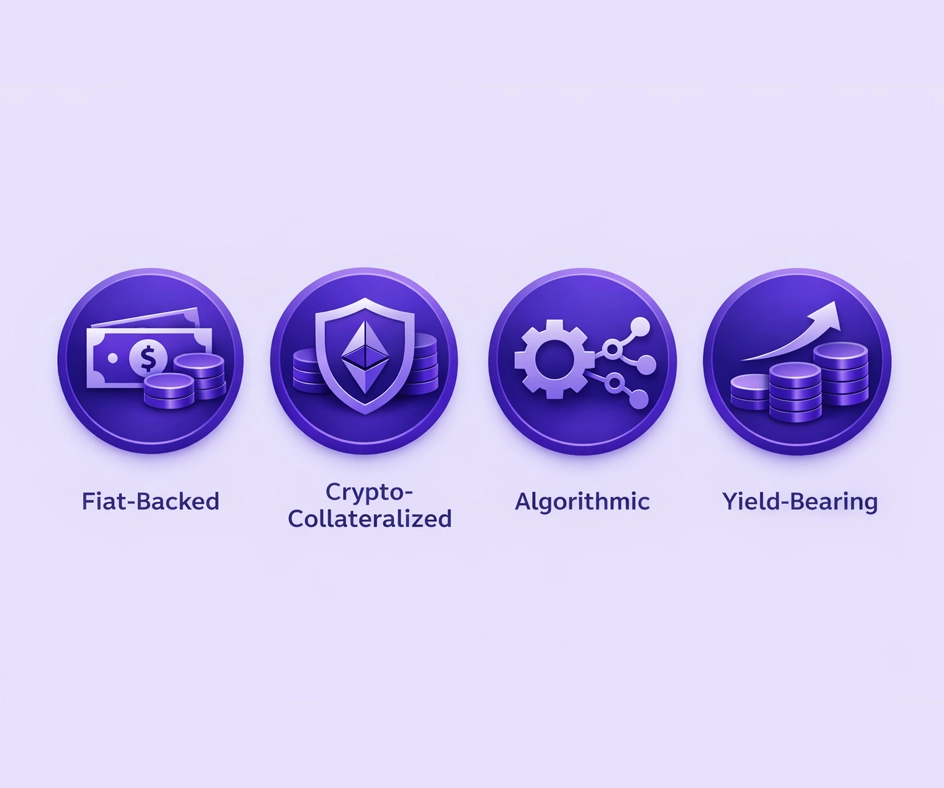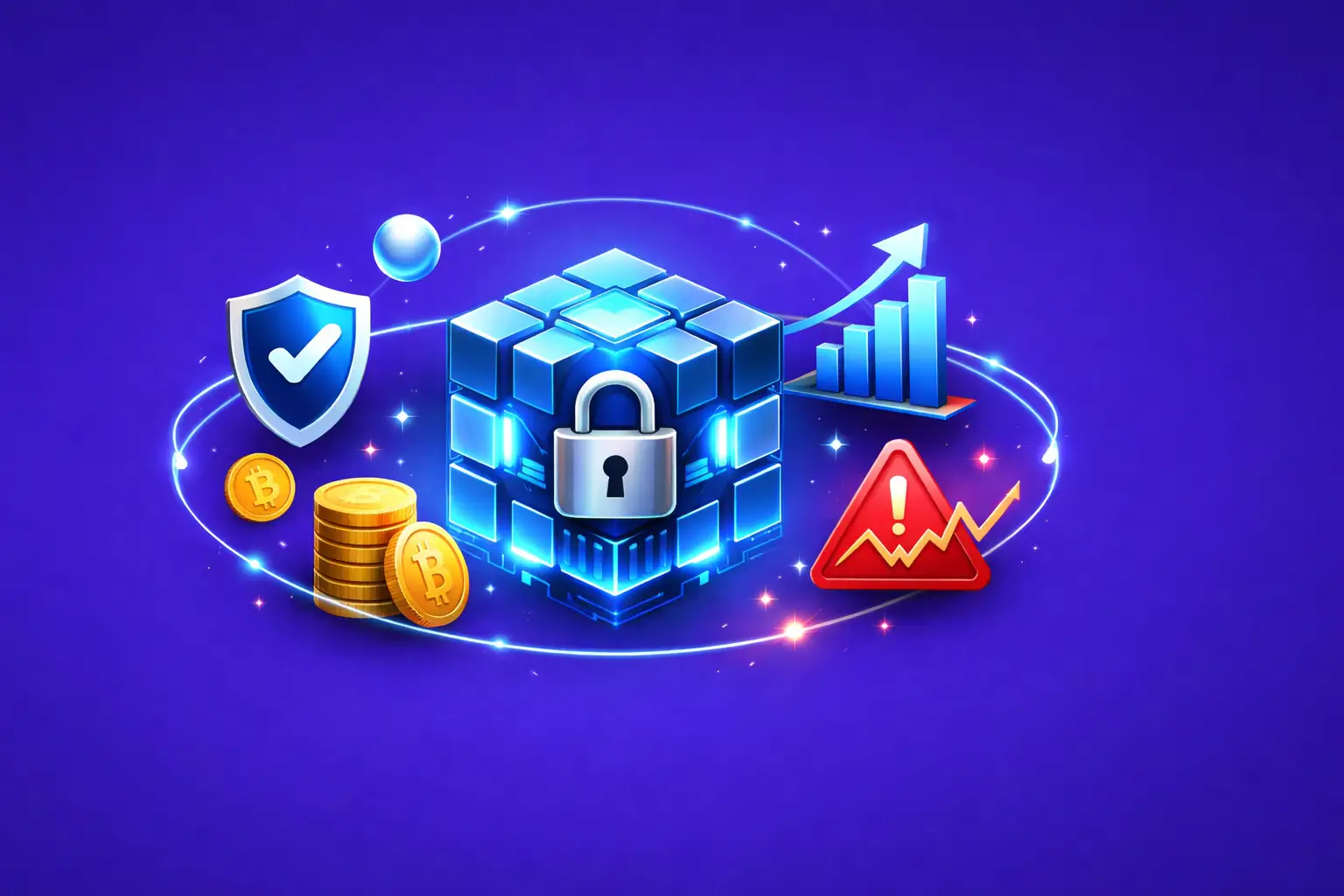Key Takeaways
- USDC and USDT remain the most liquid stablecoins on DEXs, offering traders minimal slippage and deep liquidity pools across Ethereum, Arbitrum, and Base networks.
- DAI continues to lead decentralized stablecoins in 2026, providing censorship resistance valued by users in the UK, USA, Canada, and UAE markets.
- Cross-chain stablecoin bridges have matured significantly, enabling seamless transfers between Layer 1 and Layer 2 solutions with reduced fees and faster finality.
- Algorithmic stablecoins have evolved with improved stability mechanisms, though they carry higher risk profiles compared to fiat-backed alternatives for DEX trading.
- Liquidity pool composition directly impacts swap efficiency, making stablecoin selection critical for yield farmers and liquidity providers seeking optimal returns.
- Regulatory frameworks in the USA and UK now provide clearer guidance on stablecoin reserves, increasing institutional confidence in compliant options like USDC.
- FRAX and LUSD have gained significant traction among DeFi natives seeking alternatives to centralized stablecoin issuers while maintaining price stability.
- Best stablecoins for DEX trading balance liquidity depth, decentralization level, regulatory compliance, and cross-chain availability based on specific trading strategies.
What is a Stablecoin?
A stablecoin is a cryptocurrency designed to maintain a consistent value relative to a reference asset, typically the US dollar. Unlike volatile cryptocurrencies such as Bitcoin or Ethereum, stablecoins provide price predictability that makes them essential infrastructure for decentralized exchanges and the broader DeFi ecosystem.[1]
Fiat-Backed
Collateralized by traditional currencies held in reserve by centralized custodians, offering 1:1 redemption guarantees.
Crypto-Collateralized
Backed by cryptocurrency assets locked in smart contracts, typically over-collateralized to absorb market volatility.
Algorithmic
Maintain peg through programmatic supply adjustments and market incentives without traditional collateral reserves.
Industry Standard: The best stablecoins maintain their peg within a 0.5% deviation band under normal market conditions, with top-tier options like USDC demonstrating consistent stability even during periods of elevated market stress.
Why Stablecoins Matter on Decentralized Exchanges?
Decentralized exchanges rely on stablecoins as the foundational trading pairs that enable efficient price discovery and liquidity provision. Without stable value anchors, DEX users would face compounded volatility when swapping between assets, making accurate portfolio management nearly impossible.
Real World Example: A trader in Dubai using Uniswap can swap ETH for USDC during market uncertainty, then redeploy that capital into emerging opportunities without ever touching centralized infrastructure or traditional banking rails.
How DEXs Use Stablecoins for Trading & Liquidity?
Automated market makers form the backbone of decentralized exchange infrastructure, and stablecoins play a critical role in their operation. Understanding this mechanism helps traders and liquidity providers optimize their strategies when selecting the best stablecoins for their activities.
Stablecoin Lifecycle on DEXs: 6 Step Flow
Step 1: Deposit
- User bridges stablecoins from CEX or wallet
- Tokens arrive on target chain
- Ready for DEX interaction
Step 2: Pool Selection
- Identify target trading pair
- Compare pool depths and fees
- Assess slippage estimates
Step 3: Swap Execution
- Smart contract calculates exchange rate
- AMM algorithm determines output
- Transaction submitted to network
Step 4: Settlement
- Pool reserves rebalance
- LP fees distributed
- New tokens in user wallet
Step 5: LP Provision
- Users deposit paired assets
- Receive LP tokens as receipt
- Begin earning trading fees
Step 6: Withdrawal
- Burn LP tokens to exit
- Receive proportional assets
- Collect accumulated rewards
Operational Guideline: Always verify stablecoin contract addresses before interacting with DEX pools. Fraudulent tokens mimicking popular stablecoins remain a persistent threat across all major networks.
Main Types of Stablecoins in DeFi
The DeFi ecosystem hosts several distinct stablecoin categories, each with unique characteristics that influence their suitability for different trading and yield strategies. Selecting the best stablecoins requires understanding these fundamental differences.
| Type | Collateral | Examples | Risk Level | Decentralization |
|---|---|---|---|---|
| Fiat-Backed | USD reserves, T-Bills | USDC, USDT, TUSD | Low | Centralized |
| Crypto-Collateralized | ETH, BTC, other crypto | DAI, LUSD, sUSD | Medium | Decentralized |
| Algorithmic | Protocol mechanisms | FRAX, crvUSD | Higher | Hybrid |
| Yield-Bearing | Staked assets, RWAs | sDAI, USDe | Medium | Varies |

How to Choose the Best Stablecoins for DEXs?
Selecting the optimal stablecoin depends on your specific use case, risk tolerance, and the networks you operate on. Our agency recommends evaluating these critical factors before committing capital to any stablecoin strategy.
Top Fiat-Backed Stablecoins in 2026
Fiat-backed stablecoins dominate DEX trading volumes due to their simplicity and regulatory clarity. These tokens represent the best stablecoins for traders prioritizing liquidity and institutional acceptance across markets in the USA, UK, UAE, and Canada.
Real World Example: A Canadian institutional fund executing a $2 million ETH acquisition on Uniswap v3 achieves under 0.1% slippage using the ETH/USDC pool due to its exceptional depth exceeding $500 million in concentrated liquidity.
Best Crypto-Collateralized Stablecoins
Crypto-collateralized stablecoins appeal to users prioritizing decentralization and censorship resistance. These represent the best stablecoins for DeFi natives who want to minimize counterparty risk from centralized issuers.
Leading Crypto-Backed Options
MakerDAO DAI
Multi-collateral, governance-driven, most battle-tested decentralized stablecoin
Liquity LUSD
ETH-only collateral, immutable contracts, zero governance risk
Synthetix sUSD
SNX-backed, integral to Synthetix ecosystem, perpetuals trading focus
Process Principle: Crypto-collateralized stablecoins require over-collateralization ratios typically ranging from 110% to 150%, creating a buffer that absorbs price volatility while maintaining the dollar peg.
Algorithmic Stablecoins in 2026
Following the Terra/UST collapse in 2022, algorithmic stablecoins have undergone significant redesign. Modern implementations incorporate hybrid mechanisms combining algorithmic adjustments with partial collateralization to prevent death spirals.[2]
Risk Advisory
Algorithmic stablecoins carry elevated risk profiles. Our agency recommends limiting exposure to under 10% of stablecoin holdings and conducting thorough mechanism analysis before deployment in DEX strategies.
FRAX has emerged as the most successful hybrid model, combining algorithmic supply adjustments with USDC collateral. Curve’s crvUSD utilizes an innovative soft liquidation mechanism that gradually rebalances positions rather than triggering cascade liquidations.
Real World Example: A UK-based DeFi protocol integrated crvUSD into their yield strategy, benefiting from Curve’s deep liquidity while accepting the additional smart contract complexity inherent to algorithmic designs.
USDT vs USDC on DEXs
The choice between USDT and USDC represents a fundamental decision for DEX traders. Both qualify as best stablecoins for different use cases, and understanding their distinctions helps optimize trading outcomes.
| Criteria | USDT | USDC |
|---|---|---|
| Total Supply | $140B+ | $45B+ |
| Reserve Transparency | Quarterly | Monthly |
| US Regulatory Status | Uncertain | Compliant |
| DEX Pool Depth | Highest | Very High |
| L2 Availability | Excellent | Excellent |
| Best For | Maximum liquidity, Asia/MENA | Institutional, USA/UK/Canada |
Performance Consideration: For trades exceeding $100,000, compare real-time pool depths on aggregators like 1inch or Paraswap before selecting your stablecoin pair to minimize execution costs.
DAI as the Leading Decentralized Stablecoin
DAI maintains its position as the best stablecoin for users prioritizing decentralization. Governed by MakerDAO, DAI represents a decade of battle-tested stability through multiple market cycles, black swan events, and protocol upgrades.
DAI Ecosystem Advantages
DAO Governance
Community-driven decisions via MKR token voting
Proven Security
10+ years without major smart contract exploits
sDAI Yield
Earn DSR yield while maintaining liquidity
Wide Integration
Supported across all major DEXs and L2s
Real World Example: A privacy-focused trader in the UAE utilizes DAI exclusively to avoid potential freezing risks associated with centralized stablecoin issuers while maintaining full DEX functionality.
FRAX, LUSD & Other Rising Stablecoins
Beyond the dominant players, several innovative stablecoins have carved significant niches in the DEX ecosystem. These alternatives often provide unique features that make them the best stablecoins for specific strategies.
Emerging Stablecoin Profiles
FRAX
- Hybrid algorithmic model
- Deep Curve integration
- frxETH LSD ecosystem
- Strong governance community
LUSD
- Immutable smart contracts
- Zero governance risk
- ETH-only collateral
- True decentralization
GHO
- Aave-native stablecoin
- Multi-collateral support
- Facilitator model
- Growing DeFi adoption
How Stablecoin Liquidity Pools Work?
Liquidity pools form the foundation of DEX trading infrastructure. Understanding their mechanics helps traders and LPs optimize their stablecoin deployment for maximum efficiency when seeking the best stablecoins for their strategies.
Recommended Risk Check: Before providing liquidity, verify the pool’s historical trading volume, fee tier, and impermanent loss exposure using analytics platforms like DeFiLlama or Revert Finance.
Slippage, Liquidity & Fees Explained
Execution quality on DEXs depends on three interconnected factors that directly impact trading costs. Mastering these concepts is essential for selecting the best stablecoins and optimizing swap outcomes.
Slippage
The difference between expected and executed price. Larger trades in shallow pools experience higher slippage. Set tolerance levels appropriately to prevent failed transactions.
Liquidity Depth
Total value available for trading at current prices. Deep pools absorb large orders with minimal price impact. Always check TVL before executing significant swaps.
Trading Fees
Protocol fees paid to liquidity providers. Stablecoin pools typically charge 0.01% to 0.05%. Compare across DEXs and aggregators for optimal execution.
Major Risks of Stablecoins on DEXs
Even the best stablecoins carry inherent risks that traders must acknowledge and manage. Our agency emphasizes risk awareness as a fundamental component of sustainable DeFi strategies.
Critical Risk Categories
Depegging Risk
Stablecoins can lose their peg during market stress, black swan events, or issuer insolvency. Monitor real-time prices across aggregators.
Smart Contract Risk
Vulnerabilities in stablecoin or DEX contracts can lead to loss of funds. Prioritize audited, battle-tested protocols with insurance options.
Regulatory Risk
Centralized issuers can freeze addresses or be subject to enforcement actions. Particularly relevant for users in heavily regulated jurisdictions.
Bridge Risk
Cross-chain stablecoin transfers introduce additional attack vectors. Use official bridges and verify destination contract authenticity.
Cross-Chain Stablecoins in DeFi
The multichain DeFi landscape demands stablecoins with robust cross-chain infrastructure. The best stablecoins in 2026 offer native deployments across major networks, reducing bridge dependencies and associated risks.
Network Coverage Comparison
Real World Example: A multichain trader based in Canada executes arbitrage strategies across Arbitrum, Optimism, and Base using native USDC deployments, avoiding bridge fees and minimizing cross-chain settlement delays.
Use Cases: Swaps, Yield Farming & LPing
Stablecoins enable diverse DeFi strategies beyond simple trading. Understanding optimal deployment patterns helps users maximize returns while managing risk appropriately when utilizing the best stablecoins.
Spot Trading
Use stablecoins as quote currency for volatile asset trades. Exit to stables during downturns to preserve capital without leaving DeFi rails.
Yield Farming
Deposit stablecoins into lending protocols or vaults for passive yield. Compound strategies across multiple protocols for enhanced returns.
Liquidity Provision
Provide liquidity to AMM pools and earn trading fees. Stablecoin pairs minimize impermanent loss while generating consistent income.
Compliance & Governance Checklist
Institutional adoption of stablecoins requires adherence to compliance frameworks across jurisdictions. This checklist helps organizations in the USA, UK, UAE, and Canada navigate regulatory requirements when selecting the best stablecoins.
Institutional Compliance Framework
Reserve Verification
Confirm issuer provides regular third-party attestations or audits of reserve holdings matching circulating supply.
Regulatory Licensing
Verify issuer holds appropriate licenses in relevant jurisdictions including money transmitter licenses where required.
AML/KYC Policies
Review issuer’s anti-money laundering procedures and know-your-customer requirements for redemption processes.
Smart Contract Audits
Confirm multiple independent security audits from reputable firms with publicly available reports and remediation status.
Insurance Coverage
Evaluate available insurance products covering smart contract failures, depegging events, or custodian insolvency.
Governance Structure
Understand decision-making processes for protocol changes, emergency procedures, and stakeholder rights.
Want the Right Stablecoins for Your DEX?
Get expert guidance on choosing secure, high-liquidity stablecoins for your DeFi platform.
Future Trends for Stablecoins on DEXs
The stablecoin landscape continues evolving rapidly. Understanding emerging trends helps forward-thinking traders and institutions position themselves advantageously when selecting the best stablecoins for future strategies.
Industry Standard Emerging: Proof-of-reserves attestations are becoming mandatory expectations for serious stablecoin projects, with real-time on-chain verification replacing periodic third-party audits.
Conclusion
Selecting the best stablecoins for decentralized exchange trading requires balancing multiple factors including liquidity, decentralization, regulatory status, and cross-chain availability. USDC and USDT remain dominant for maximum liquidity, while DAI leads decentralized alternatives. Newer entrants like FRAX and LUSD offer compelling features for specific use cases.
Our agency recommends diversifying stablecoin holdings across multiple types and issuers to mitigate concentration risk. Traders in the USA, UK, Canada, and UAE should consider local regulatory implications when selecting stablecoins for significant positions.
The stablecoin ecosystem continues maturing with improved transparency, enhanced cross-chain capabilities, and clearer regulatory frameworks. Staying informed about these developments positions traders and institutions to capitalize on opportunities while managing evolving risks effectively.
Final Recommendation: Start with established, high-liquidity stablecoins for core trading activities, then gradually explore decentralized alternatives as you develop familiarity with their unique characteristics and risk profiles. The best stablecoins for your strategy depend on your specific requirements, risk tolerance, and operational jurisdiction.
Frequently Asked Questions
Stablecoins are cryptocurrency assets designed to maintain a stable price, usually pegged to fiat currencies like USD. On decentralized exchanges (DEXs), they act as a reliable medium of exchange, allowing users to trade without worrying about large market fluctuations. They also serve as liquidity anchors, helping pools maintain balanced pricing. This stability is essential for seamless swaps, better liquidity depth, and reduced volatility risk across decentralized trading ecosystems.
DEXs use stablecoins as base trading pairs in liquidity pools, enabling predictable and low-slippage swaps. Traders can hedge market volatility by converting volatile tokens into stable values instantly. Stablecoins also help pools rebalance during high market movement, supporting consistent pricing. For yield farmers, stablecoins offer safer opportunities in liquidity mining and staking. Overall, they allow smoother trading, improved liquidity, and broader participation in decentralized finance ecosystems.
The best stablecoins for DEX trading typically include USDT, USDC, DAI, FRAX, and newer decentralized stable assets. These stablecoins offer high liquidity, strong market adoption, and consistent peg stability, making them ideal for fast swaps. DEX users generally prefer assets with large trading volumes and lower depeg risks. When selecting stablecoins, factors like governance model, collateral backing, and transparency also play critical roles in ensuring safe and reliable decentralized trading.
The best stablecoins for liquidity pools depend on peg stability, market reputation, trading volume, and collateral reserves. Stablecoins with strong backing and transparency maintain value better during volatile periods. Liquidity depth is equally important because it directly impacts slippage and swap fees. DEX users usually choose stablecoins with proven security, on-chain transparency, and wide integration across DeFi protocols. These factors ensure more predictable returns for liquidity providers.
Algorithmic stablecoins can be efficient and capital-light, but they also carry higher risk because they rely on smart-contract-based supply adjustments instead of collateral backing. While some models have shown resilience, others have failed during extreme market conditions. On DEXs, they offer good liquidity but may experience temporary depegs. Users should always check the stability history, governance structure, and community trust before relying heavily on algorithmic stablecoins for trading or liquidity.
Fiat-backed stablecoins are supported by reserves like USD, T-bills, or cash equivalents stored off-chain, offering high stability and regulatory compliance. Crypto-collateralized stablecoins, however, use on-chain assets such as ETH or BTC as collateral, usually over-collateralized to maintain peg stability. While fiat-backed coins provide more predictable value, crypto-backed options offer greater transparency and decentralization. Traders on DEXs often choose based on risk tolerance, regulatory comfort, and ecosystem integration needs.
To minimize depeg risk, always analyze a stablecoin’s backing mechanism, on-chain transparency, and historical stability. Look for assets with regular audits, diversified reserves, and consistent performance during market volatility. Monitoring liquidity depth on major DEXs also helps because low-liquidity pools are more likely to experience slippage and temporary depegs. Diversifying your stablecoins instead of relying on a single asset is another effective way to reduce potential losses.
Yes, stablecoins significantly reduce slippage because their prices remain steady, unlike volatile crypto assets. When paired in liquidity pools, they help maintain balanced pricing during swaps, especially for high-volume trades. Stablecoins also contribute to deeper liquidity, ensuring traders can execute larger orders without unexpected price impacts. This consistency is why most major DEXs prefer stablecoin-denominated pools. Ultimately, stablecoins support smoother and more predictable decentralized trading experiences.
Stablecoins suitable for yield farming typically offer high liquidity, strong peg stability, and integration with major DeFi protocols. Low volatility reduces impermanent loss, making stable pools safer for passive income seekers. The reward structure of DEXs also influences stablecoin attractiveness because some pools provide additional incentives in governance tokens. Security audits, collateral transparency, and on-chain reserves further determine whether a stablecoin is safe and profitable for long-term farming.
By 2026, stablecoins on DEXs are expected to become more transparent, regulation-friendly, and backed by diversified reserves. Decentralized stablecoins may gain more traction as DeFi matures and users seek censorship-resistant options. New models may combine both on-chain and real-world assets. Liquidity routing, cross-chain swaps, and L2 integrations will improve stablecoin efficiency. Overall, stablecoins will play an even more central role in shaping decentralized trading ecosystems.
Reviewed & Edited By

Aman Vaths
Founder of Nadcab Labs
Aman Vaths is the Founder & CTO of Nadcab Labs, a global digital engineering company delivering enterprise-grade solutions across AI, Web3, Blockchain, Big Data, Cloud, Cybersecurity, and Modern Application Development. With deep technical leadership and product innovation experience, Aman has positioned Nadcab Labs as one of the most advanced engineering companies driving the next era of intelligent, secure, and scalable software systems. Under his leadership, Nadcab Labs has built 2,000+ global projects across sectors including fintech, banking, healthcare, real estate, logistics, gaming, manufacturing, and next-generation DePIN networks. Aman’s strength lies in architecting high-performance systems, end-to-end platform engineering, and designing enterprise solutions that operate at global scale.







